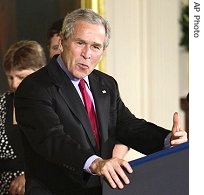-
(单词翻译:双击或拖选)
By Melinda Smith
Washington
27 June 2007
Some U.S. scientists say President Bush's veto last week of federal funding for stem cell research raises questions about the future of the U.S. involvement in the field. Mr. Bush rejected Congressional legislation that would have expanded federal money for research on discarded human embryos2. The president says he is opposed on religious grounds to the use of human embryos. VOA's Melinda Smith looks at the future of stem cell research in the United States in light of this veto.

President Bush speaking at the White House about stem cell research, 20 Jun 2007
It has been almost a decade since scientists at the University of Wisconsin were the first to isolate3 stem cells from human embryos and maintain their viability4 in the laboratory. The discovery raised hopes that these cells could eventually lead to treatment for a multitude of incurable5 ailments6 such as Alzheimer's and Parkinson's diseases, cancer and spinal7 cord injuries.
For years Americans played a leading role in the development of stem cell science. Now other countries have stepped up their research and have begun attracting some scientists from the U.S. Two scientists from Stanford University in California cite the decline in recent years of stem cell research papers published in the U.S.
Sean Tipton of the Coalition8 for the Advancement9 of Medical Research in Washington, D.C. says U.S. laboratories are paying the price for White House opposition10. "We want scientific decisions made by scientists, not by politicians."
California and New Jersey11 are among those states where biomedical research on stem cells still thrives. In 2004, a voter initiative led to the formation of the California Institute for Regenerative Medicine. It operates the world's largest fund for embryonic12 stem cell research.
In 2005, California Governor Arnold Schwarzenegger committed state funds to stem cell research. "I am very much interested in stem cell research and support it 100 percent."
Dale Carlson, with the Institute, says, "California has 25 percent of the biomedical research capability13 in this country. We need the other 75 percent fully14 engaged and pursuing these therapies."
There is research underway on stem cells taken from adults, amniotic fluid produced in pregnant women, as well as tissue from mice. But Dr. Arnold Kriegstein of the University of California in San Francisco believes embryo1 stem cells are still the best source. "The truth is none of these alternatives really have the potential that embryonic stem cells do to create cells of different types. [Such as] heart cells, muscle cells, nerve cells and so forth15."
Those opposed to using human embryos in stem cell research have had strong support from President Bush during both of his terms in office. Yet polls show a majority of Americans favor an increase in funding on the issue. Some scientists still working in the field say they are hoping American research will pick up again after the presidential election in 2008.
 收听单词发音
收听单词发音
1
embryo

|
|
| n.胚胎,萌芽的事物 | |
参考例句: |
|
|
|
2
embryos

|
|
| n.晶胚;胚,胚胎( embryo的名词复数 ) | |
参考例句: |
|
|
|
3
isolate

|
|
| vt.使孤立,隔离 | |
参考例句: |
|
|
|
4
viability

|
|
| n.存活(能力) | |
参考例句: |
|
|
|
5
incurable

|
|
| adj.不能医治的,不能矫正的,无救的;n.不治的病人,无救的人 | |
参考例句: |
|
|
|
6
ailments

|
|
| 疾病(尤指慢性病),不适( ailment的名词复数 ) | |
参考例句: |
|
|
|
7
spinal

|
|
| adj.针的,尖刺的,尖刺状突起的;adj.脊骨的,脊髓的 | |
参考例句: |
|
|
|
8
coalition

|
|
| n.结合体,同盟,结合,联合 | |
参考例句: |
|
|
|
9
advancement

|
|
| n.前进,促进,提升 | |
参考例句: |
|
|
|
10
opposition

|
|
| n.反对,敌对 | |
参考例句: |
|
|
|
11
jersey

|
|
| n.运动衫 | |
参考例句: |
|
|
|
12
embryonic

|
|
| adj.胚胎的 | |
参考例句: |
|
|
|
13
capability

|
|
| n.能力;才能;(pl)可发展的能力或特性等 | |
参考例句: |
|
|
|
14
fully

|
|
| adv.完全地,全部地,彻底地;充分地 | |
参考例句: |
|
|
|
15
forth

|
|
| adv.向前;向外,往外 | |
参考例句: |
|
|
|















